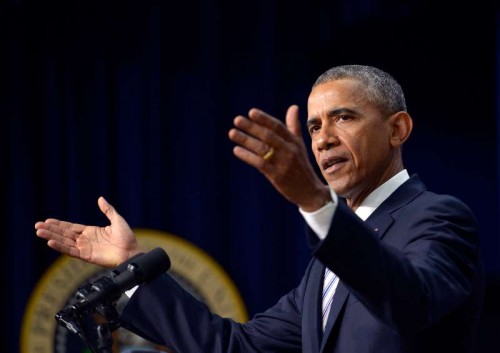
US President Barack Obama pledged continued support with training and equipment to help combat the Islamic State (IS) in Iraq.
The ongoing fighting against the extremist group dominated Obama’s talks with Iraqi Prime Minister Haider al-Abadi at the White House, who is on his first visit to the US, Xinhua reported.
Obama “pledged to continue to support Iraqi security forces and tribal engagement initiatives with US training and equipment,” the two countries said in a joint statement released at the conclusion of talks.
Obama cited “serious progress” being made in pushing back the militants from areas it had seized. “Success will not occur overnight, but what is clear is that we will be successful,” he told reporters.
The joint statement said Abadi stressed the importance of ” stabilising” areas liberated from the militant group, asking for assistance from Washington and the coalition to enable “immediate and long-term stabilisation” in these areas.
The US-led coalition has launched more than 1,900 airstrikes on IS targets in the past eight months and helped the Iraqi forces retake 25 to 30 percent of populated areas lost to the group, including the Mosul Dam, Sinjar Mountain, Diyala and Tikrit, according to the White House.
The Iraqi security forces, joining hands with tribal militias, are launching a counter-offensive in the western province of Anbar.
The Obama administration has delivered arms and equipment to the Iraqi government since the fall of 2014, including over 100 million rounds of ammunition, 62,000 small arms systems, 1,700 Hellfire missiles and six M1A1 tanks, the White House said.
Washington is working on the delivery of F-16 fighters to Baghdad, with 30 Iraqi pilots being trained in the US.
What is more, some 3,000 American troops have been sent back to help train and advise the Iraqi and Kurdish forces after Obama ordered a complete troop withdrawal from the Arab country in 2011.
Obama on Tuesday announced an additional 200 million dollars in humanitarian aid to Iraq, as more than 2.6 million Iraqis have been internally displaced since January 2014.
On the nuclear talks with Iran, al-Abadi hailed a framework deal reached early this month between the Islamic republic and the major powers — the US, Britain, China, France, Russia plus Germany, “as a means towards greater peace and stability in the region.”
Iran and the six powers are aiming for a final and comprehensive deal by the end of June.
With a 22-billion-US-dollar deficit at hand, Abadi is also scheduled to meet with Christine Lagarde, managing director of the International Monetary Fund, and Jim Yong Kim, president of the World Bank, during his current four-day trip.
Before leaving for Washington DC, the Iraqi leader indicated that he would ask for stepped-up air raids on IS targets as well as US drones and other arms worth billions of dollars.